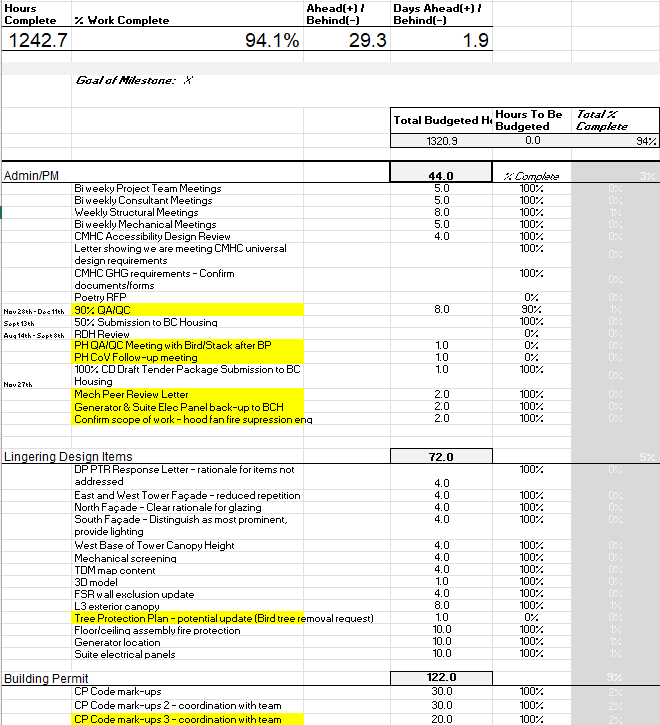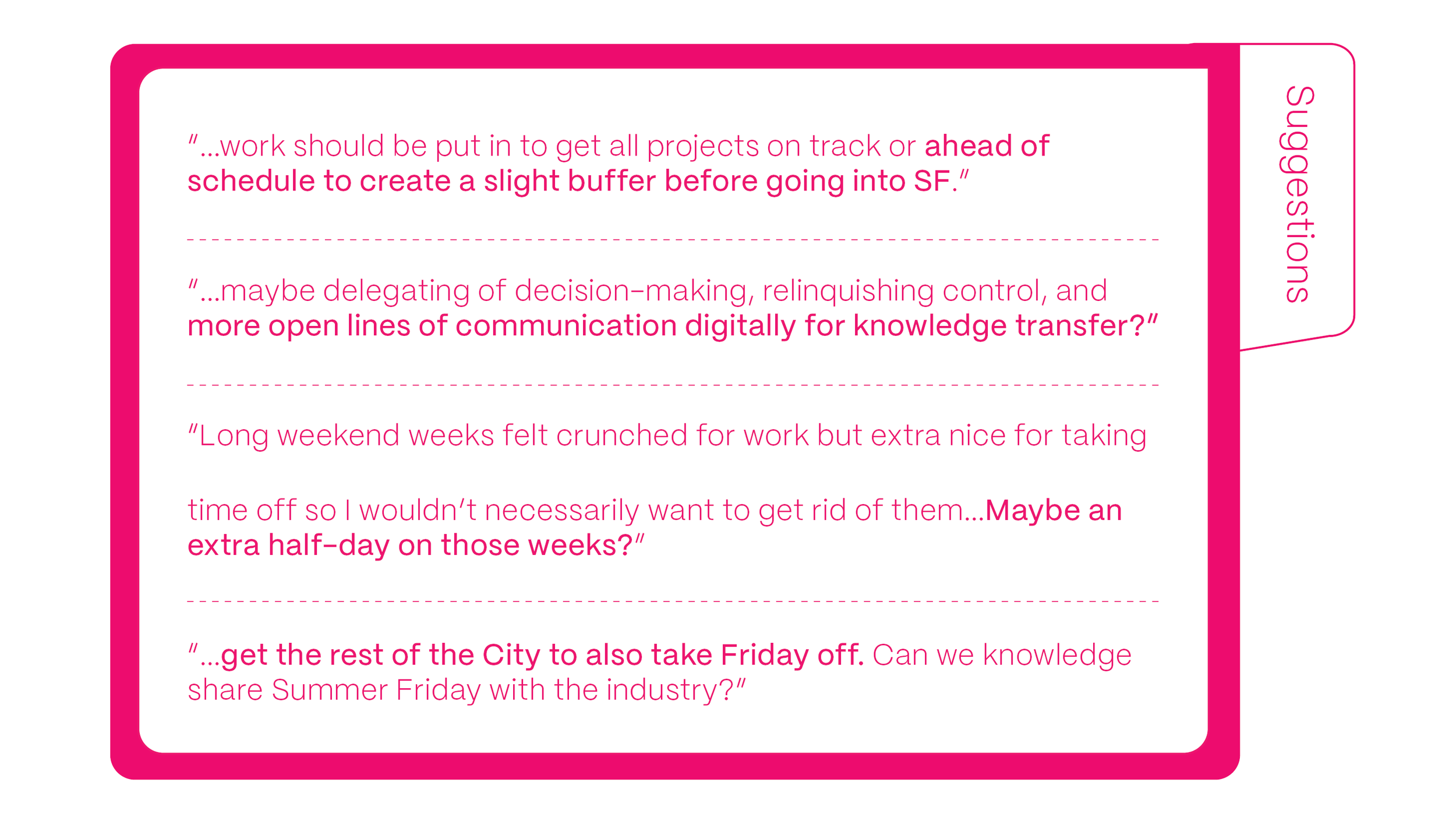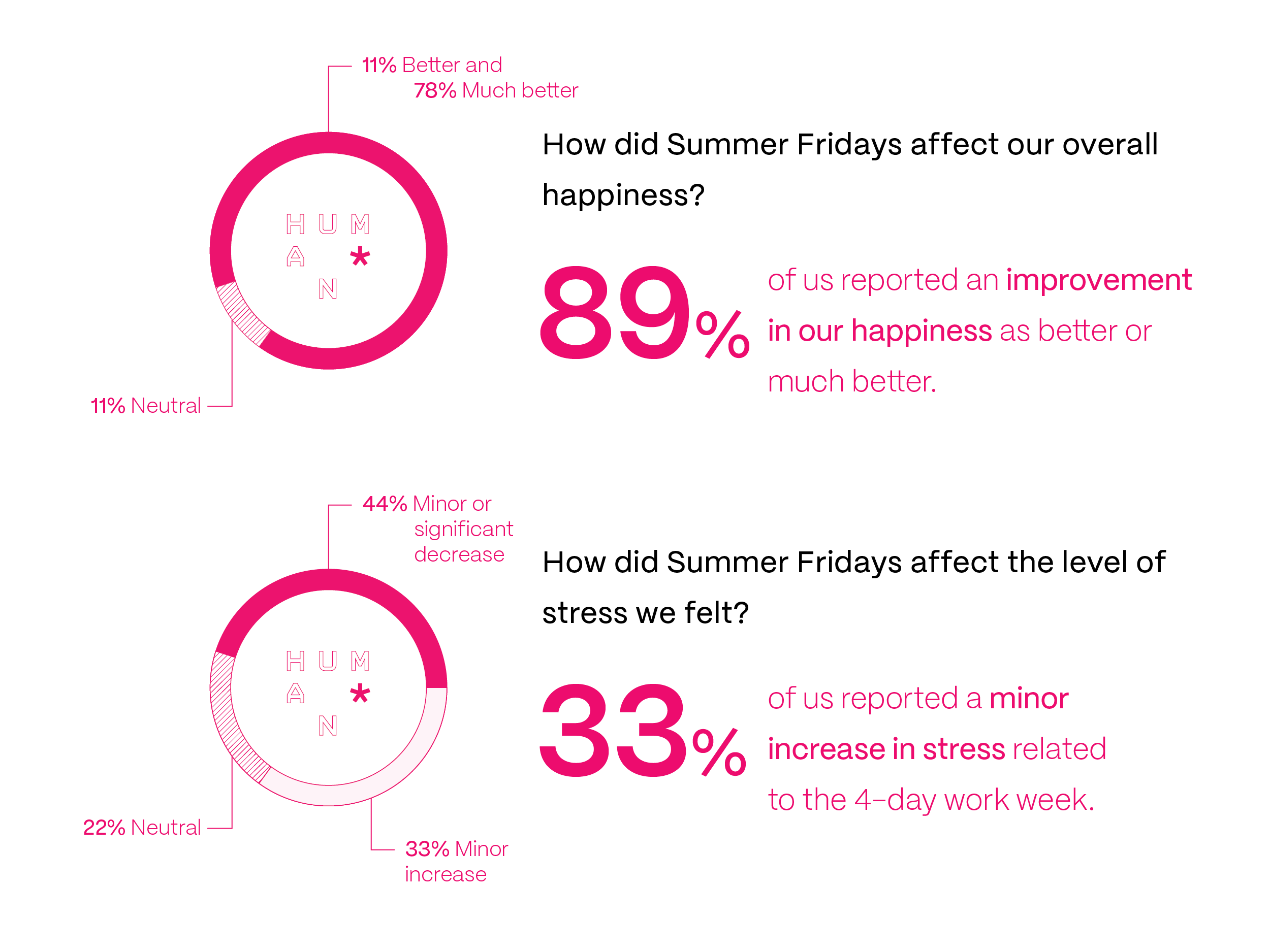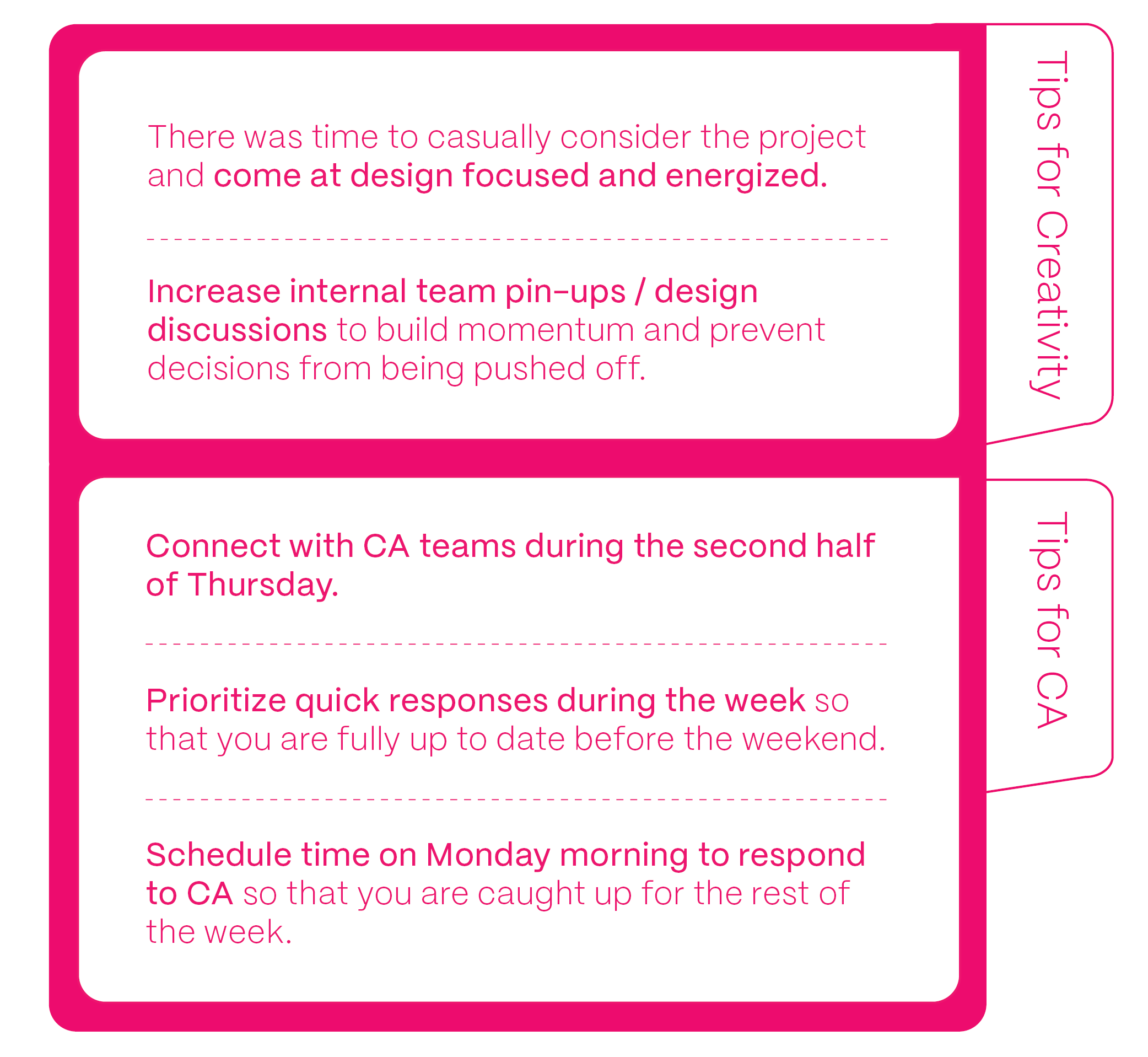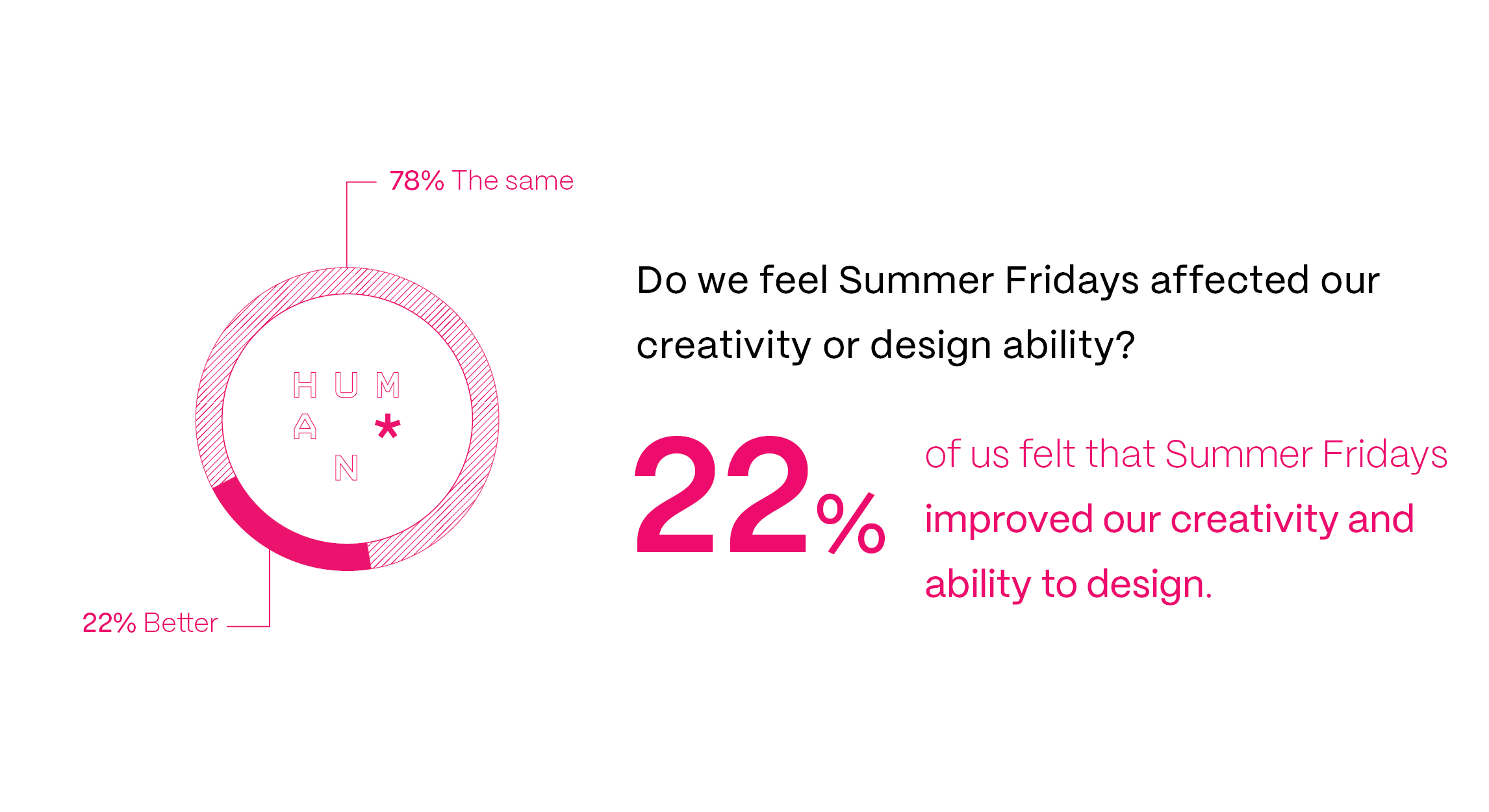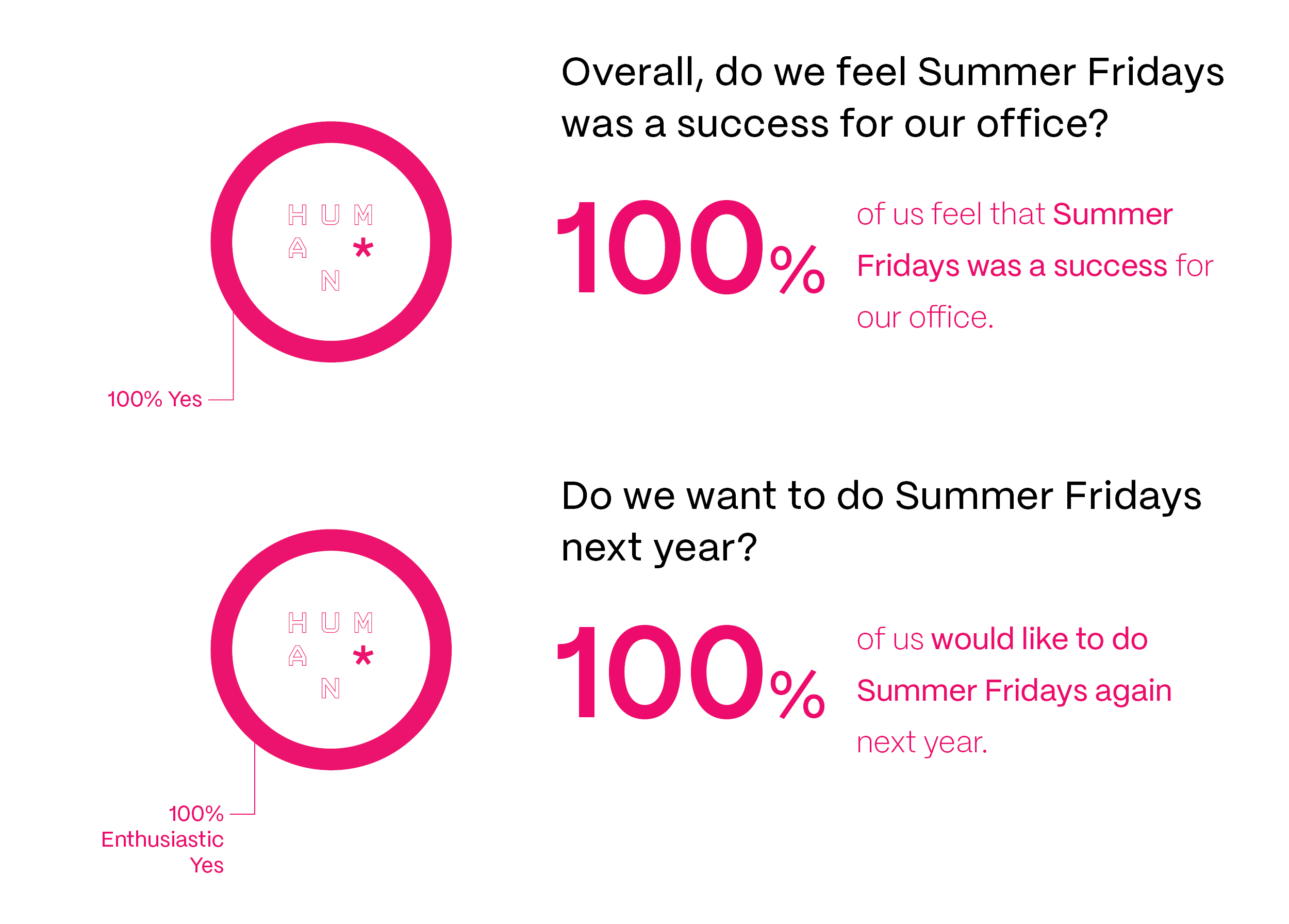An Account of Summer Fridays
by Zahra Asghari
A snapshot of our Summer Fridays.
As a beacon of hope in the depths of winter, we are here to (finally) bring you a retrospective on our Summer Fridays experiment. As promised, we are going to fill you in on all the highs, lows, and happy mediums.
To the surprise of no one, everyone enjoyed the long weekends and generally felt there was a better work-life balance. We continued our work on schedule and hit project deadlines (no angry Friday phone calls were received). But you’re probably here reading this because you want to know the details, and we are not about to gatekeep. From the beginning, we intended to collect as much data as possible to determine the experiment’s level of success and its effects on our work, health, and happiness. And while this experiment and its effects are specific to Human Studio, we hope our insights can push more firms to try out the 4-day work week (at least) during the summer and (maybe, just maybe) for more of the year.
To assess the effects of a four day work week, we took a three-pronged approach:
Weekly project check-ins with the project team and a review of the project task tracker
Bi-weekly check-ins at our staff meetings with the entire office
A post-experiment in-depth survey
Weekly Check-ins and Project Task Tracker
A snapshot of Pete’s brain.
We have found weekly internal project team check-ins to be a vital part of our project management system and have continued this practice past the Summer Fridays. Usually held on Monday mornings, this meeting allows everyone on the project team in the office to discuss any pressing issues, prioritize the week’s tasks for each team member and review the schedule. It is also the meeting where we look at our project task tracker to evaluate our progress and get a comprehensive project overview.
During the Summer Fridays, this meeting ensured we were on track to hit our deadlines and proactively make any adjustments needed.
The task tracker was developed by Pete (our in-house excel expert) based on our internally-developed Process Flow system, which guides our QA/ QC process throughout the project. Process flows are a systems thinking approach to the design process to ensure our submission packages are complete and on schedule.
Bi-weekly Check-ins
These check-ins were done as part of our typical office-wide meetings to get an overview of where all the projects were at, how they were tracking, and whether any staffing shifts needed to happen to add more resources to a project. It was also about accountability and an incentive for project managers to keep their tracking up to date so they could accurately report on how projects were progressing.
On a general note, we use our staff meeting to give a brief update on all the active projects in the office both as a point of interest and a learning opportunity. The Summer Friday check-ins fit perfectly into that format and fostered on-going learning.
Survey
In September, while we were adjusting back to the 5-day work weeks and he was gearing up for his bike-packing honeymoon in Croatia (journal post to follow), Jamie sent out a survey to see what everyone thought about Summer Fridays. The survey categories were Personal Vibes, Industry Auras, Time Feels, Cultural Spirits, Financial Juices, Job Satisfaction Energies, and Productivity Crystals.
Personal Vibes
100% of us reported that our happiness was the same or had improved and 2 out of 3 Humans said that their stress levels were less or about the same. However, 1 out of 3 of us felt a minor increase.
People found the best part of Summer Fridays to be “Getting outdoors and enjoying the BC life,” “Feeling more balanced and energized for personal projects and passions,” and “Time for socializing with colleagues and friends outside of work.”
Industry Auras
This section looked at our relationship with the consultants and clients of our projects. Most people found no change in that relationship, and 11% noticed an improvement.
Time Feels
Naturally, the biggest challenge of Summer Fridays was the time impact. We had the most challenges with weeks that had Monday stat holidays, which became 3-day work weeks. 75% of Humans agreed that we should handle those weeks differently.
The CA projects required some more involvement and coordination, as would be expected. It was important to let the team, general contractor, and client know well in advance that we were switching to Summer hours. This allowed everyone to plan ahead and anticipate the change without causing any disruption to the work progress. We also asked our contractors to get their RFIs to us on Thursdays rather than the typical Friday push so we are able to respond to them before the weekend. The Humans working on CA projects prioritized responding to emails and reviewing RFIs/SIs/SDs/etc Monday morning to catch up on any work that might have come in on Friday. And ultimately, the contractor knew that if anything required urgent attention, we were available by phone (thankfully, we didn’t have many of those.)
We were also curious how the four-day workweek would impact everyone’s creativity - would they feel they do not have the time to be creative? Did anyone have to prioritize other more urgent tasks over taking a couple of hours to work on some design iterations? However, 3 out of 4 people felt no impact on their creativity, and 1 in 4 actually felt an improvement in their ability to design.
Cultural Spirits
One of the trade-offs we made to make Summer Fridays possible was to put education and skill sharing on hold, and in retrospect, we all agreed that it was a good idea and made no significant impact because we could pursue those outside of work. Another surprising statistic was that 90% of us felt that our connections with each other and office culture were unaffected or better because of Summer Fridays.
Financial Juices
Human Studio has a very open and transparent policy on the firm’s financials. Pete (the aforementioned excel whiz) shares financial updates at every bi-weekly staff meeting and everyone from co-op students to principals are able to get a look at how the projects are performing, what the outlook is, and the financial year to date. Exposure to this side of the business is especially valuable to the younger staff since the business of running an architecture firm is never taught in architecture schools. We carried this process through Summer Fridays and people thought that sharing the financial information meant they were “Inspired to push hard, be productive, and learn about the relationship between time and capacity to get work done,” “Grateful that we have chosen to spend money on this,” and noted that financial transparency were “Crucial metrics to help guide people’s behaviour.” In previous workplaces, where the company’s financials were only discussed behind closed doors, the employees were often unaware of how their projects were tracking until a supervisor showed up one day to tell them they were over budget, behind schedule, and under-delivering. It comes as a shock and makes you question your capabilities and skills, not to mention creates incredible stress and strain on all parties. However, transparency and open communication about the project’s financials allows for proactive actions and ongoing accountability by everyone working on the project.
Job Satisfaction Energies
Summer Fridays can be considered as a part of a firm’s perks and half of us said that it makes a huge difference in our evaluation of our workplace. Almost everyone responded that they feel less of a need to take vacation time off in the summer and are more likely to spread it evenly over the year. This both ensures that there is not a concentration of vacation at one time and allows more flexibility in booking getaways - perhaps avoiding peak seasons (in this economy!).
Productivity Crystals
A strong majority said that Summer Fridays acted as an incentive to focus on ways to improve productivity and almost everyone felt that they could achieve the same or more work in that time. Perhaps most importantly, the anxiety of burning out was much less during Summer Fridays. We could be focused and work a bit extra during the week if needed, with the comfort that there was a reset day every week that would not take away from the standard 2-day weekend we were more used to. You could use your weekend more fully to spend time with friends and family.
Most of us feel that the productivity initiatives put in place helped us during Summer Fridays fairly well, however, a majority still found it moderately difficult to meet responsibilities and stay on schedule. However, it is important to note that there are a lot of variable that play into managing responsibilities and keeping on schedule, such as phase and complexity of work, consultant and client vacations, and city processes (not to mention the ever-looming sense of being behind we all feel at all times always). This has inspired us to collect more data throughout the year to try to account for these variables better and develop solutions.
Next Steps
To truly assess the impacts of the Summer Fridays, we need to conduct this same survey during the 5-day workweek period to have a comparable data set. That way, we can more accurately determine the effects of the reduced work week on stress and productivity levels. However, given the information at hand, we feel that Summer Fridays has had many positive impacts on us as individuals and as a firm. The extra day off allowed us to feel more focused and energized at work. Although it is unclear whether the reduced stress was due to reduced working hours or everything else people have going on in their lives, the 4-day work week allowed people more flexibility in managing their responsibilities both inside and out of the office.
But it’s not all sunshine and rainbows. There were areas we thought would need improvement if and when we do this again.
Some ideas to address these issues are to codify the steps required in the advanced planning for Summer Fridays, establish clear handovers for task delegation and decision-making to keep projects moving, have a different approach to 3-day stat weeks, set up ways to mitigate the demand of projects in a CA phase of work and create a plan on resuming back to normal after Summer Fridays.
Where do we go from here? Well, we are hoping to repeat Summer Fridays this year, but in order to do that, we need to address the issues above first. So, we are going to be working away on those solutions as a team in the next few months to gear up for round two of this experiment because we believe in its potential to improve our studio all year round. It has already lit a fire under us to hone in our project tracking and management tools, and every lesson that we learn from this experiment is also applicable every other month of the year. And most importantly, it has a significant positive impact on everyone’s mental health.
If you or your office is interested in trying out Summer Fridays for yourself and want to chat through it with any of us, please feel free to shoot us an email, and we can get into the nitty-gritty of it all over some coffee and baked goods.
In the meantime, please enjoy these very lovely things we said about each other, captured as part of the Summer Fridays survey when we were asked what the best thing about the office culture is for us.


